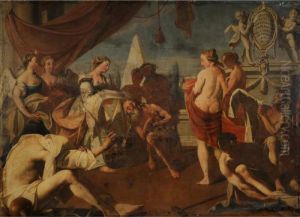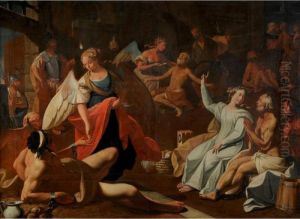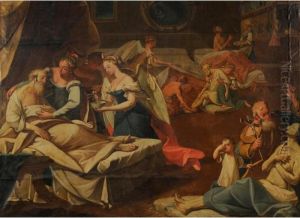Giovanni Antonio Cybei Paintings
Giovanni Antonio Cybei was an Italian sculptor born in 1706 in Carrara, a city renowned for its high-quality marble, which has been a favored material for sculptors throughout history. Cybei came from a family with artistic inclinations; his father, Pietro Cybei, was also a sculptor. Giovanni Antonio Cybei's life and career were deeply rooted in his hometown, which was a central hub for sculptors due to the abundant supply of marble from its quarries.
Cybei received his initial training from his father and later continued to develop his skills, possibly studying under other established artists of the time. He worked primarily in marble, and his style was characterized by the Baroque and Rococo influences that were prevalent during his lifetime. Cybei's work included religious figures, funerary monuments, and decorative pieces for both private and public commissions.
During his career, Cybei became a well-respected artist in Carrara and beyond. He was appointed as the director of the Carrara Academy of Fine Arts, a position that allowed him to influence the next generation of sculptors. Through this role, he played a vital part in the artistic community, nurturing the talents of young artists and ensuring the continuation of Carrara's sculptural heritage.
Notable works by Giovanni Antonio Cybei include the altar of the Collegiata in Fosdinovo and various statues and reliefs in the churches and public spaces of Carrara and its surroundings. His artistic legacy is also preserved through his students, who carried on his techniques and style.
Cybei died in 1784 in his birthplace of Carrara. His significant contribution to the art of sculpture, particularly marble sculpture, is still recognized today. The city of Carrara, with its ongoing tradition of marble quarrying and sculpture, continues to celebrate Cybei as one of its most important historical artistic figures.


